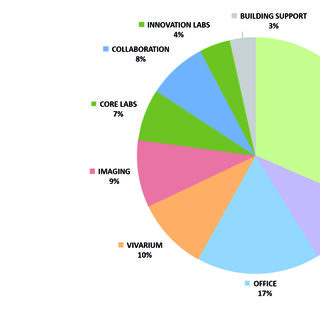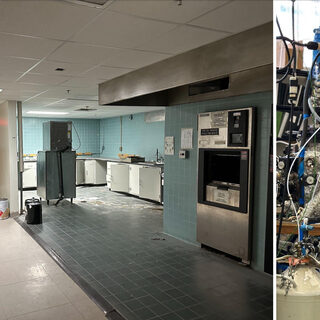Tradeline's industry reports are a must-read resource for those involved in facilities planning and management. Reports include management case studies, current and in-depth project profiles, and editorials on the latest facilities management issues.
Latest Reports
Emory University Integrates Massive High-Technology Equipment into the Design of its New Health Sciences Center
More and more universities are building their scientific research centers around cores of huge, heavy, yet surprisingly delicate equipment. Building a core laboratory facility forces architects and campus planners to think about logistics, timing, and backup systems to a level of detail probably more familiar to NASA engineers than institutional architects. As the team behind Emory University’s new Health Sciences Research Building II (HSRB-II) learned, a huge range of factors—in their case, everything from the amount of rebar in the flooring to the width of the corridors to shipping velocity on the Suez Canal—must be reckoned with before such a facility is completed.
Oregon State University Builds the First Mass Plywood Lab Building in the U.S.
Mass timber construction is widely lauded for its sustainability benefits, including wood’s natural carbon sequestration, lower embodied energy footprint, lighter weight compared to steel or concrete, and essential renewability. But does it pay off in terms of a university’s performance standards and cost concerns when embarking on a project as ambitious as Oregon State University’s Jen-Hsun and Lori Mills Huang Collaborative Innovation Complex, a $213 million, 143,000-sf facility dedicated to advanced programs in artificial intelligence, robotics, energy, and materials science? Scott Ashford, OSU’s dean of the College of Engineering, and Libby Ramirez, the university’s resident architect, argue that with careful strategy and an eye toward the data, the answer is “yes.”
Oregon State University Builds the First Mass Plywood Lab Building in the U.S.
Mass timber construction is widely lauded for its sustainability benefits, including wood’s natural carbon sequestration, lower embodied energy footprint, lighter weight as compared to steel or concrete, and essential renewability. But does it pay off in terms of a university’s performance standards and cost concerns when embarking on a project as ambitious as Oregon State University’s Jen-Hsun and Lori Mills Huang Collaborative Innovation Complex, a $213 million, 143,000-sf facility dedicated to advanced programs in artificial intelligence, robotics, energy, and materials science? Scott Ashford, OSU’s dean of the College of Engineering, and Libby Ramirez, the university’s resident architect, argue that with careful strategy and an eye toward the data, the answer is “yes.”
Transforming Classrooms, Labs, and Project Spaces into Vibrant, Future-Proofed Environments
Science and engineering are constantly moving knowledge forward, and that means updates to the way we teach and do research. But buildings tend to remain artifacts of the time in which they were built. The future is flexible, and agile design with an inclusive approach can help turn old buildings into places where the next wave of scientists and engineers can flourish.
Athletic Facilities Designed to Accommodate Women at All Levels
One of the biggest sea changes in both professional and collegiate athletics is the increased participation of women at all levels—as team owners, athletes, coaches, officials, and staff. Coverage of women’s basketball and women’s soccer, which eclipsed men’s soccer for a time, seems to dominate the sports news cycle, and viewership is expected to keep rising in 2025. The Professional Women’s Hockey League played its first game in January 2024, and the world’s first stadium built solely for a professional women’s sports team opened in March 2024. January 2025 saw the inauguration of a new 3x3 women’s professional basketball league, called Unrivaled, based in Miami. Revenue from women’s sports nearly doubled in 2024, to $1.88 billion globally, and is projected to reach $2.35 billion in 2025. More than half of that revenue came from North America, and investors are taking note.





